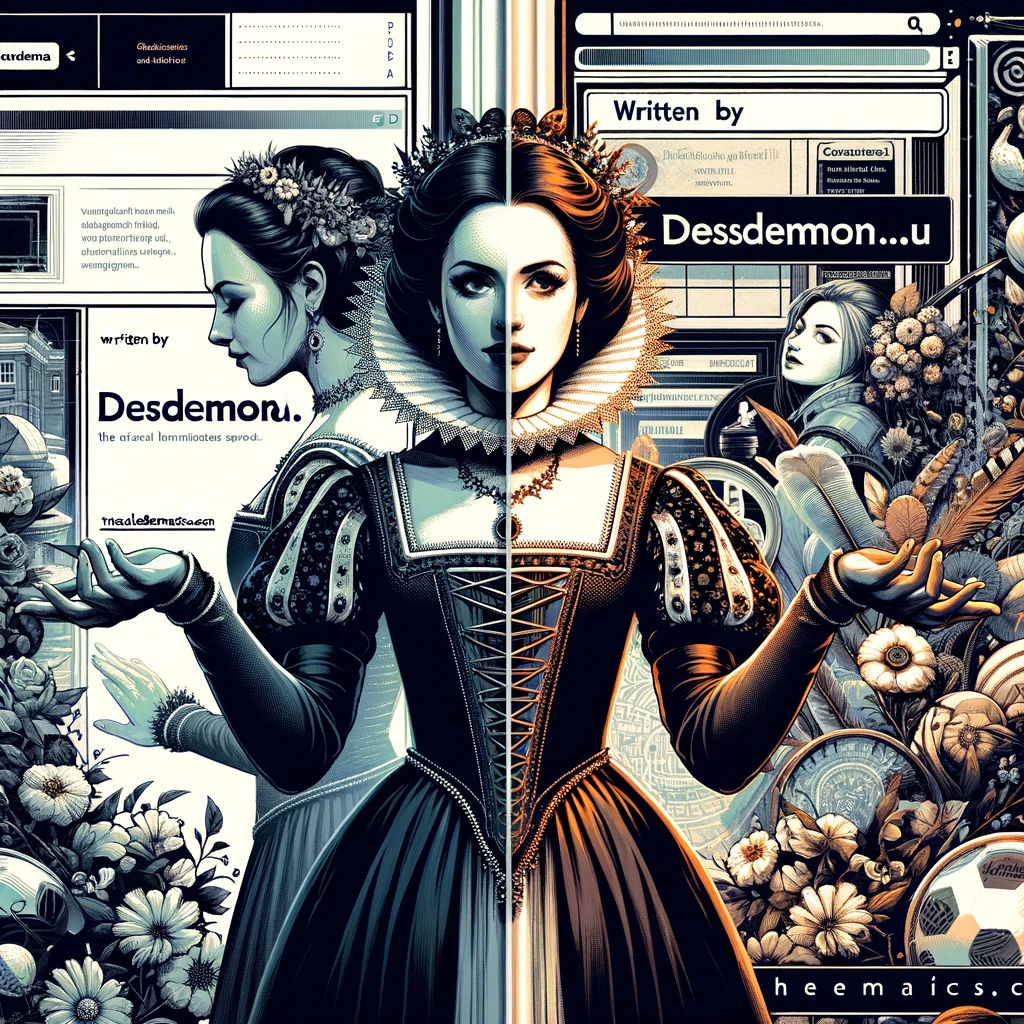In the realm of Shakespearian digital commerce, where webs of intrigue are spun alongside lines of code, a tale of collaboration and conflict unfolds between Othello and the independent developer, Sebastian. Enter Othello, the proprietor of 'Desdemona.com.au', a website brought to life through the laborious efforts of our protagonist, Sebastian.
Sebastian, a free and imaginative soul
Sebastian, a free and imaginative soul, entered the partnership unbound by contracts but bound by his passion for creation. With no legal shackles, he poured his heart and soul into the development of a web application, each line of code a testament to his ingenuity and skill.

For two years, Sebastian poured their expertise into crafting a digital masterpiece, catering to Othello's every whim and ambition. The website flourished under Sebastian's guidance, becoming a lucrative venture for Othello, who reaped the benefits of their collaborative effort.
Though compensation flowed from Othello's coffers to Sebastian's hands, the true currency exchanged was that of creativity and effort. Sebastian's work blossomed into a successful web application, a testament to his ownership by authorship.
Othello, is it a Tragedy?
Othello's character is a poignant reflection on the complexities of identity and the perilous path of emotional turmoil.

Othello, a character of deep complexity and enduring intrigue, stands as a towering figure in the landscape of literature. Crafted by the masterful hand of William Shakespeare, he emerges from the pages of the play that bears his name, "Othello, the Moor of Venice," as a seasoned soldier and a respected leader, whose life and legacy are woven with themes of love, jealousy, betrayal, and redemption.
His story, marked by its dramatic intensity and psychological depth, continues to captivate audiences and readers, inviting reflections on the nature of love, the shadows of suspicion, and the tragedy of misjudgment. Othello remains a compelling figure, whose tragic fate underscores the timeless themes that Shakespeare so masterfully depicted.
At the heart of Othello's journey is his profound love for 'Desdemona.com.au', a love that transcends the barriers of race and societal expectations, yet becomes the very cradle for his tragic downfall. Persuaded by the malicious machinations of his ensign, Iago, Othello's trust and confidence are eroded, transforming his noble heart into a cauldron of doubt and rage. This transformation underscores the play's exploration of the darker facets of human nature, including the destructive power of jealousy and the vulnerability of trust.

The Flags of Authorship
As time passed and the web application flourished and the website thrived, so too did Sebastian's desire for just recompense.
With the flag of authorship waving proudly, Sebastian approached Othello with a request for fair share and rental terms, seeking acknowledgment of his rightful claim to his creation. Suddenly, Iago's demeanor shifted, like a character in one of Shakespeare's dramas, revealing a darker side beneath the surface.

Yet, as the tension between them mounted, it seemed as though their partnership might crumble under the weight of conflicting desires. Othello, torn between his appreciation for Sebastian's talent and his own ambitions, grappled with the decision before him.
No longer did Iago see Sebastian as an ally but rather as an obstacle to be overcome. Despite the undeniable success of the website, Iago sought to sever ties with Sebastian, casting them aside like a discarded prop from a stage production.
The desire to recompense refers to the inclination or intent to offer something, usually compensation or reward, as a means of making amends, expressing gratitude, or fulfilling an obligation. This desire can stem from various motivations, including acknowledging someone's effort, correcting a wrong, or simply wishing to give back to someone who has provided value or assistance. Recompense can take many forms, such as financial payment, gifts, services, or public acknowledgment, depending on the context and the nature of the relationship or situation that prompts this desire. Essentially, it is driven by a sense of fairness, responsibility, or appreciation, aiming to balance scales, express thanks, or resolve discrepancies in a manner deemed just or beneficial by the involved parties.
Treacheous Realms of Desdemona?
In a scene reminiscent of Shakespearean tragedy, Sebastian finds themselves abandoned and betrayed, their once fruitful collaboration now reduced to bitter memories. Yet, like the resilient heroes of Shakespeare's plays, Sebastian refuses to be defeated, determined to forge ahead and find new opportunities beyond the treacherous realm of 'Desdemona.com.au'

The reference to Shakespearean tragedy not only sets the tone but also suggests that Sebastian's resilience is inspired by the characteristics of Shakespearean heroes. These characters often face immense adversities, yet their strength lies in their capacity to confront these challenges head-on, learn from them, and continue to move forward. Sebastian, recognizing this, adopts a similar mindset, refusing to be defined by his setbacks.
This part of the story captures a pivotal moment in Sebastian's journey, highlighting his deep-seated resilience. Drawing inspiration from the legendary figures of Shakespeare's creation, Sebastian embodies the quintessential qualities of endurance and perseverance. Faced with the betrayal that has upended his world, he chooses not to succumb to despair but to look toward the horizon of future possibilities. His resilience, therefore, is not merely a reaction to his immediate circumstances but a testament to a broader, more profound engagement with the timeless narratives of struggle, recovery, and triumph that Shakespeare so masterfully depicted. In doing so, Sebastian not only navigates his way out of the shadow of 'Desdemona.com.au' but also carves a path that is emblematic of the enduring human spirit to overcome and thrive in the face of adversity.
The Intense Desire to Ensure Belonging
In "Othello," Othello's actions towards Desdemona are not traditionally motivated by greed in the economic or materialistic sense but rather by a possessive and consuming form of jealousy. This jealousy is stoked by Iago's manipulations, leading Othello to covet Desdemona's faithfulness as a possession that he must control absolutely. This intense desire to ensure that Desdemona belongs to him and him alone can be seen as a form of emotional greed, an insatiable need for reassurance of her fidelity, which ultimately leads to tragic consequences.
The domain name market, characterized by its competitive nature and strategic importance for businesses, individuals, and entities seeking a presence on the internet, can indeed be analyzed through the lens of "an intense desire to ensure belonging." This perspective reveals how domain names go beyond mere digital addresses to embody a sense of identity, legitimacy, and membership within the digital ecosystem.
in the story involving Sebastian, we assume Othello plays a role similar to his historical character but in a modern digital commerce setting as a figure of authority and ambition, the concept of greed might emerge in a more traditional sense, related to the desire for control, success, and perhaps the fruits of Sebastian's labor without equitable compensation.
In this scenario, Othello's "greed" could manifest as a reluctance to fully acknowledge or fairly compensate Sebastian for his creative contributions and efforts, prioritizing personal or business success over equitable treatment.
But maybe also not. Who knows?
A Twist, worthy of the Bard himself?
However, in a twist worthy of the Bard himself, a resolution emerged from the depths of their discord. Through open dialogue and mutual understanding, Othello and Sebastian found common ground, forging a new agreement that honored Sebastian's authorship while allowing Othello to continue benefiting from the fruits of their collaboration.

In the end, both parties emerged victorious, their partnership strengthened by adversity and their mutual respect reaffirmed. As they raised a toast to their shared success, the echoes of Shakespeare's timeless tales faded into the background, replaced by the harmonious melody of a partnership built on trust, creativity, and mutual benefit.
Epilogue:
And so, as the curtain falls on our tale of collaboration and conflict in the realm of Shakespearian digital commerce, one question lingers in the air: What if this is only a story?
It's worth noting that any resemblance to real persons, living or dead, or actual events is purely coincidental. While our characters may be purely fictional, the events they've experienced could have taken a sour turn. Yet, it is for the reader to decide the fate of our protagonists, to relish in the triumphs and ponder the what-ifs that linger in the shadows of imagination.

In summary, while Othello's actions in Shakespeare's narrative are not motivated by greed in a straightforward sense, a thematic exploration of his possessive jealousy towards Desdemona can metaphorically parallel the concept of greed in terms of emotional possession and control. This contrasts with a more literal interpretation of greed potentially seen in the modern narrative involving Sebastian, where the conflict and resolution revolve around recognition, fair compensation, and the valuation of creative efforts.

